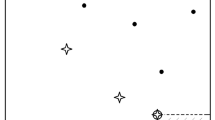Abstract
We consider a model of individual preferences in which the preference of each individual is characterized by a stochastic vector (stochastic model of preferences). Using a sociological survey or analysis of user actions in an online social network, it is possible to obtain the probability distribution of individual preferences. The problem of finding the median preference—a vector that minimizes the expected distance to the preferences of individuals—is posed and solved. It is shown that knowing partial (marginal) distributions is sufficient to find the median preference. Illustrative examples of finding median preferences for the three-dimensional case are provided.
Similar content being viewed by others
REFERENCES
Devyatko, I.F., Diagnosticheskaya protsedura v sotsiologii. Ocherk istorii i teorii (Diagnostic Procedure in Sociology. Outline of History and Theory), Moscow: Nauka, 1993.
Tolstova, Yu.N., Testovaya traditsiya v sotsiologii (The Testing Tradition in Sociology), Moscow: KDU, 2007.
Chkhartishvili, A.G., Gubanov, D.A., and Novikov, D.A., Social Networks: Models of Information Influence, Control and Confrontation, Berlin: Springer, 2018.
Proskurnikov, A.V., Consensus in nonlinear stationary networks with identical agents, Autom. Remote Control, 2015, vol. 76, no. 9, pp. 1551–1565.
Kozyakin, V.S., Kuznetsov, N.A., and Chebotarev, P.Y., Consensus in asynchronous multiagent systems. I. Asynchronous consensus models, Autom. Remote Control, 2019, vol. 80, no. 4, pp. 593–623.
Gayo-Avello, D., A meta-analysis of state-of-the-art electoral prediction from Twitter data, Soc. Sci. Comput. Rev., 2013, vol. 3, no. 6, pp. 649–679.
Petrov, A.P. and Proncheva, O.G., Modeling position selection by individuals during informational warfare with a two-component agenda, Math. Models Comput. Simul., 2020, vol. 12, no. 2, pp. 154–163.
Barberá, P., Birds of the same feather tweet together: Bayesian ideal point estimation using Twitter data, Polit. Anal., 2015, vol. 23, no. 1, pp. 76–91.
Makazhanov, A., Rafiei, D., and Waqar, M., Predicting political preference of Twitter users, Soc. Network Anal. Min., 2014, vol. 4, no. 1, p. 193.
Gubanov, D.A. and Chkhartishvili, A.G., Influence levels of users and meta-users of a social network, Autom. Remote Control, 2018, vol. 79, no. 3, pp. 545–553.
Kozitsin, I.V., Chkhartishvili, A.G., Marchenko, A.M., et al., Modeling political preferences of Russian users exemplified by the social network Vkontakte, Math. Models Comput. Simul., 2020, vol. 12, no. 2, pp. 185–194.
Chkhartishvili, A.G., Kozitsin, I.V., Goiko, V.L., and Saifulin, E.R., On an approach to measure the level of polarization of individuals’ opinions, Twelfth Int. Conf. “Management of large-scale system development” (MLSD) (Moscow, 2019), pp. 1–5.
Byzov, L.G., Gubanov, D.A., Kozitsin, I.V., and Chkhartishvili, A.G., Ideal politician for a social network: an approach to analyzing the ideological preferences of users, Probl. Upr., 2020, no. 4, pp. 15–26.
Goldberg, L.R., The development of markers for the Big-Five factor structure, Psychol. Assess., 1992, no. 4, pp. 26–42.
Eysenck, S.B.G., Eysenck, H.J., and Barrett, P., A revised version of the psychoticism scale, Pers. Individ. Differ., 1985, vol. 6, no. 1, pp. 21–29.
Keirsey, D. and Bate, M., Please Understand Me: Character and Temperament Types, Del Mar, CA: Prometheus Nemesis, 1984.
Rokeach, M., The Nature of Human Values, New York: Free Press, 1973.
Byzov, L.G., Dynamics of ideological and political preferences for 25 years. Three stages of transformation of public consciousness, Rossiya XXI , 2019, no. 2, pp. 6–21.
Blinov, V.V., Types of ideological supporters in modern Russia, Monit. Obshchestv. Mneniya: Ekon. Sots. Peremeny, 2010, no. 6(100).
Shiryaev, A.N., Veroyatnost’. V 2-kh kn. 3-e izd. (Probability. In 2 Vols. 3rd Ed.), Moscow: MTsNMO, 2004.
Downs, A., An Economic Theory of Democracy, New York: Harper, 1957.
Small, C.G., A survey of multidimensional medians, Int. Stat. Rev., 1990, no. 58, pp. 263–277.
Vardi, Y. and Zhang, C.-H., The multivariate \(L \)1-median and associated data depth, Proc. Natl. Acad. Sci., 2000, no. 97 (4), pp. 1423–1426.
Chen, F. and Nason, G., A new method for computing the projection median, its influence curve and techniques for the production of projected quantile plots, PLoS ONE, 2020, no. 15(5): e0229845.
Croux, C., Filzmoser, P., and Fritz, H., A comparison of algorithms for the multivariate L1-median, Comput. Stat., 2010, vol. 27, no. 3, pp. 1–18.
Gubanov, D.A., Kozitsin, I.V., and Chkhartishvili, A.G., On identifying the ideological and political preferences of users of urban communities in an online social network, Tr. 10-i Mezhdunar. sots. Grushinskoi konf. “Zhit’ v Rossii. Zhit’ v mire. Sotsiologiya povsednevnosti” (Proc. 10th Int. Soc Grushin Conf. “Live in Russia. Live in the World. Sociology of Everyday Life”) (May 20–November 14, 2020), Moscow: VTsIOM, 2020, pp. 291–297.
Funding
This work was supported by the Russian Science Foundation, project no. 20-11-20059, in the part of solving the problem of finding a median preference.
Author information
Authors and Affiliations
Corresponding author
Additional information
Translated by V. Potapchouck
Rights and permissions
About this article
Cite this article
Chkhartishvili, A.G. The Problem of Finding the Median Preference of Individuals in a Stochastic Model. Autom Remote Control 82, 853–862 (2021). https://doi.org/10.1134/S000511792105009X
Received:
Revised:
Accepted:
Published:
Issue Date:
DOI: https://doi.org/10.1134/S000511792105009X




